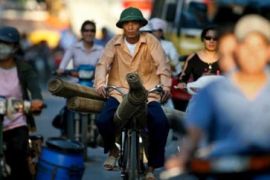Apec puts Vietnam in spotlight
This week’s summit is a chance for the host nation to showcase 20 years of economic reforms.

 |
| Vietnam is hoping to use the summit to show off Asia’s newest Tiger economy |
When Vietnam opens its doors to the Asia-Pacific Economic Co-operation summit this week, it will use the event to showcase the result of 20 years of economic reforms.
Since enacting its “doi moi” (renovation) policy in 1986 – it’s own version of the Soviet Union’s “perestroika” – Vietnam has quietly transformed itself from a poverty-stricken, centrally-planned nation to the second-fastest growing economy in South-East Asia.
Keep reading
list of 4 itemsWhy are nations racing to buy weapons?
Parallel economy: How Russia is defying the West’s boycott
US House approves aid package worth billions for Ukraine, Israel
Now Vietnam is preparing to let the world in on its little secret, hosting the leaders of some of the world’s largest economies as well as business and political leaders from around the Pacific Rim.
The meeting comes shortly after the World Trade Organisation agreed to admit Vietnam as its 150th member – which the government hopes will improve trade and investment in Vietnam, boosting incomes well beyond the current national average of about $620 a year.
Next big thing
For many investors, Vietnam is being described as the next big thing in Asia.
Its growth rate of 8.4 per cent last year exceeded that of India, Malaysia, Taiwan, South Korea and Thailand.
In 1998, 38 per cent of the population lived below the internationally-accepted poverty line of $1 a day. By 2004 that number had been nearly halved to 19.5 per cent and it is now only slightly higher than the average for South-East Asia.
Exports are driving much of the gains. Vietnam is the world’s second-largest exporter of coffee and rice.
It also exports garments, shoes, shrimp, pepper, rubber and cashews.
In the first eight months of this year it exported nearly $6bn in goods to America – nine times as much as it buys from America – while its pace of exports to the US is rising faster than China’s.
Income divide
One sector on which the government has chosen to focus is the technology industry, and a recent decision by Intel to build a $605m microchip plant in Ho Chi Minh City should help in that direction.
Challenges abound, however.
Some fear that WTO entry could accelerate Vietnam’s widening rural-urban income divide.
Inflation is a real problem, as is a shortage of skilled labour, causing salaries in some sectors to rise by 50 per cent last year.
Meanwhile, a million young Vietnamese are entering the labour force each year.
Endemic corruption is said to be slowing construction, and vested interests are hindering the government’s push to privatise.
In July the European Union imposed anti-dumping tariffs on shoes from Vietnam.
And on Monday – in a sign of possibly troubled waters ahead – the US House of Representatives voted to block a measure to normalise trade relations with Vietnam.